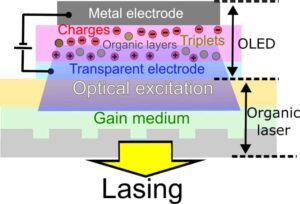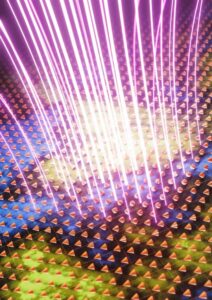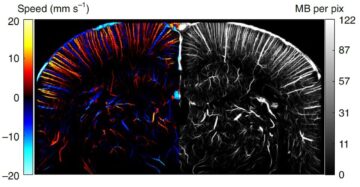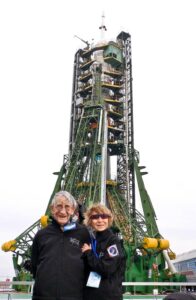Sara Webb is an astrophysicist and science communicator at the Swinburne University of Technology in Australia. Her research involves using AI and machine learning in astronomy, with a focus on finding and identifying anomalous sources of data in large and complex astrophysical surveys. She is also the mission director of the Swinburne Youth Space Innovation Challenge and in 2022 was named as one of the country’s “Superstars of STEM” – an initiative of Science and Technology Australia.
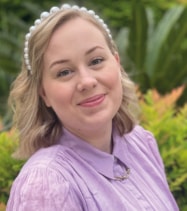
What skills do you use every day in your job?
I’m biased, but I truly think my day job is one of the coolest in the world, and what makes it so interesting to me is that every day is so different. I’m an astronomer and machine-learning researcher who works on exploring the universe and applying machine learning to novel projects. During my astronomy PhD, my work included observing on telescopes, writing code, analysing hundreds of thousands of astronomical sources and writing papers around them. After completing my PhD, though, I’ve taken a less traditional approach, applying my research in machine learning to different fields on top of my astronomical research.
The main skills I need to use every day, whether I’m working on an astronomy problem or not, are critical thinking and problem solving. It’s very rare that I start a task and complete it in one go, as research often takes twists and turns you don’t expect. This is especially true with programming, and it takes a lot of persistence and iterations to complete projects. Another skill is science communication. It is so important when working with different stakeholders in our cross-disciplinary research to be able to communicate what we are doing in clear terms. This is also key for the science communication I do in traditional and social media, as there is a need to explain or unpack complex topics for a wide range of audiences.
What do you like best and least about your job?
My favourite thing about my job is the people I get to meet and work with. Research is full of amazing people with different ideas and expertise, so you are constantly learning. A large part of research is collaborative, which means working with people from different countries and teams, and we often get to travel to different parts of the world for work. Another notable part is being one of the first people to look at the pictures of the universe we’re taking. It’s always beautiful and humbling.
My least favourite part is the uncertainty of research funding and jobs in academia. It’s a pretty untraditional job, and means that for a large part of our careers we are planning for each next stage and job availabilities. But the uncertainty and ever-changing landscape of research can lead to some amazing opportunities.
What do you know today that you wish you knew when you were starting out in your career?
I wish I knew that most (if not all) people experience some form of “impostor syndrome”. I often felt out-of-place for various reasons throughout my studies; sometimes it was being one of the few women in a massive lecture theatre, and other times it was comparing myself to peers and thinking I hadn’t achieved enough. I wish I had known I wasn’t alone in these thoughts, and that I hadn’t let my own insecurities stop me from applying for opportunities and awards when I was younger.
Something that has been eye-opening as I work with different people, all with amazing careers, is hearing them express similar thoughts. Unfortunately, impostor syndrome seems to be a universal feeling, especially for gender minorities in STEM. I hope that by sharing just how common it is, it might encourage young scientists to not let it hold them back.
I also wish I knew how crucial work–life balance was, and that I couldn’t do my best work if I was burnt out and tired. Rest and relaxation is one of the best gifts I’ve given myself in the past couple of years and it’s made me a better researcher.
- SEO Powered Content & PR Distribution. Get Amplified Today.
- PlatoData.Network Vertical Generative Ai. Empower Yourself. Access Here.
- PlatoAiStream. Web3 Intelligence. Knowledge Amplified. Access Here.
- PlatoESG. Automotive / EVs, Carbon, CleanTech, Energy, Environment, Solar, Waste Management. Access Here.
- PlatoHealth. Biotech and Clinical Trials Intelligence. Access Here.
- ChartPrime. Elevate your Trading Game with ChartPrime. Access Here.
- BlockOffsets. Modernizing Environmental Offset Ownership. Access Here.
- Source: https://physicsworld.com/a/ask-me-anything-sara-webb-its-always-beautiful-and-humbling-to-be-one-of-the-first-to-look-at-the-pictures-of-the-universe-were-taking/
- :has
- :is
- :not
- 2022
- a
- Able
- About
- Academia
- achieved
- After
- AI
- All
- alone
- also
- always
- amazing
- an
- Analysing
- and
- Another
- anything
- Applying
- approach
- ARE
- around
- AS
- astronomy
- At
- audiences
- Australia
- awards
- back
- Balance
- BE
- beautiful
- been
- being
- BEST
- Better
- biased
- burnt
- but
- by
- CAN
- Career
- careers
- challenge
- clear
- click
- code
- collaborative
- Common
- communicate
- Communication
- comparing
- complete
- completing
- complex
- constantly
- countries
- country’s
- Couple
- critical
- crucial
- data
- day
- different
- Director
- do
- doing
- Dont
- during
- each
- encourage
- enough
- especially
- ever-changing
- Every
- every day
- expect
- experience
- expertise
- Explain
- Exploring
- express
- few
- Fields
- finding
- First
- Focus
- For
- form
- from
- full
- funding
- Gender
- get
- gifts
- given
- Go
- had
- hearing
- her
- hold
- hope
- How
- HTTPS
- Hundreds
- i
- ideas
- identifying
- if
- image
- important
- in
- included
- information
- Initiative
- Innovation
- interesting
- issue
- IT
- iterations
- Job
- Jobs
- jpg
- just
- Key
- Know
- known
- landscape
- large
- lead
- learning
- least
- Lecture
- less
- let
- like
- Look
- Lot
- machine
- machine learning
- made
- Main
- MAKES
- massive
- max-width
- me
- means
- Media
- Meet
- might
- minorities
- Mission
- most
- my
- Named
- Need
- next
- notable
- novel
- of
- often
- on
- ONE
- open
- opportunities
- or
- Other
- our
- out
- own
- papers
- part
- parts
- passionate
- past
- peers
- People
- persistence
- phd
- Physics
- Physics World
- Pictures
- planning
- plato
- Plato Data Intelligence
- PlatoData
- pretty
- Problem
- Programming
- projects
- range
- RARE
- RE
- reasons
- relaxation
- research
- researcher
- REST
- s
- Science
- Science and Technology
- scientists
- seems
- sharing
- she
- similar
- skill
- skills
- So
- Social
- social media
- Solving
- some
- Sources
- Space
- Stage
- stakeholders
- Stars
- start
- Starting
- Stem
- Stop
- studies
- Swinburne University of Technology
- taken
- takes
- taking
- Task
- teams
- Technology
- telescopes
- terms
- that
- The
- the world
- theatre
- Them
- There.
- These
- thing
- think
- Thinking
- this
- though?
- thousands
- throughout
- thumbnail
- times
- tired
- to
- today
- top
- Topics
- traditional
- travel
- true
- truly
- turns
- twists
- Uncertainty
- unfortunately
- Universal
- Universe
- university
- use
- using
- various
- very
- was
- we
- were
- What
- when
- whether
- which
- WHO
- wide
- Wide range
- with
- Women
- Work
- working
- works
- world
- writing
- years
- You
- young
- Younger
- Your
- youth
- zephyrnet





